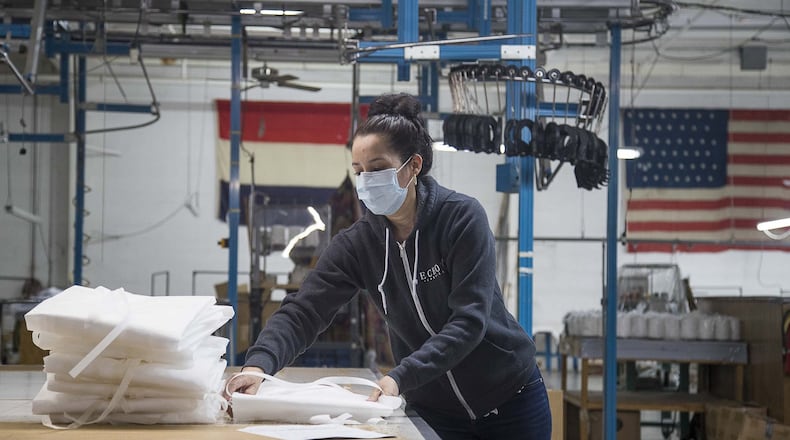It started as a small-scale effort to help friends on the front lines of northwest Georgia’s coronavirus response. Within days it blossomed into an unusual partnership between a handful of textile companies to craft and assemble hundreds of thousands of pieces of personal protective equipment desperately needed by nearby hospitals.
Multiple manufacturers clustered around the state’s textile hub of Dalton — from corporate giants to small outfits and their competitors — said they’ve shifted increasing portions of their capacities over the past several weeks from making everyday products such as rugs and drapes to producing isolation gowns, masks and other emergency medical equipment.
The arrangement likely will be temporary, organizers say, but they hope it will help ease local supply shortages during the fast-moving pandemic.
“This is 25 times bigger than what we would have thought in the first few days because the need is that bad,” said Chris Simuro of Dalton, who helped spearhead the effort.
Textiles aren't the only Georgia industry to ramp up production of medical equipment as their traditional lines of business have taken sharp economic hits. Many Georgia businesses and institutions, from Home Depot to Georgia Tech and the Atlanta Opera, have heeded Gov. Brian Kemp's call to manufacture, distribute and store personal protective equipment if they can. Similar efforts are afoot across the country, even as President Donald Trump has remained hesitant to invoke the 70-year-old Defense Production Act to compel manufacturers to make such supplies.
This particular collaboration in North Georgia, however, has provided a jolt of energy to a sector that's been reshaped in recent decades by plant closures, outsourcing and automation.
“This is a scary time,” said Will Ostuw, whose Calhoun-based family company, Echota Fabrics, has joined the effort. “For myself and our employees, it’s nice to find purpose in something.”
The endeavor started in mid-March, when Simuro, president of Fabric Sources International, and the company’s Chief Operating Officer Matt Williams were catching up with some local doctor friends. Like hospitals across the country, Dalton’s Hamilton Medical Center was rapidly exhausting its stockpile of personal protective equipment, and the doctors asked if the fabric company could pitch in.
So Simuro and Williams got to work.
FSI specializes in converting, laminating and coating non-woven fabrics such as those used in dryer sheets and sports synthetic-turf fields so they don’t absorb moisture. The duo suspected a special laminate their company carried would be ideal for non-surgical medical isolation gowns.
They made some prototypes, and after a design was approved, they realized they needed a partner that could cut and sew the gowns. So they called Bart Hill, an executive at Mohawk Home, a division of the Calhoun flooring empire that specializes in rugs and floor mats.
“We immediately started working with them to create a manufacturing process in their facility,” Simuro said.
Mohawk assembled a mini production line of 10 people at one of their Dalton facilities that would do much of the sewing and packing by hand.
On their first day, March 31, Mohawk completed 300 gowns, Hill said. Three days later, it finished 1,200. As of Thursday, the company had devoted multiple production lines to sewing 3,000 medical garments a day at two North Georgia factories.
“We were starting to double our production every day,” said Hill, a senior vice president for Mohawk Home. Hill expects his company will eventually be able to sew 5,000 gowns a day.
“We can get our hands on enough of the fabric,” he said. “It’s just a matter if we can cut and sew these things quick enough.”
The orders quickly piled up. Not only was Hamilton Medical interested in gowns, but Emory Healthcare wanted to place an order. Soon after, hospitals from Massachusetts and Minnesota were expressing interest. On Wednesday, Simuro said FSI had committed to producing 500,000 gowns.
To keep up with demand, FSI, which employs about 35 people, enlisted a handful of nearby textile companies to help with cutting, sewing and packaging. Among them are Garland Sales and Echota Fabrics, which typically manufactures drapes and other window treatments for the hospitality industry. The latter also is making masks and hand sanitizer through Ostuw’s compound pharmacy, which he’s been delivering to the local hospital in five-gallon plastic buckets.
FSI and Mohawk also have begun making protective face shields at a rate of about 8,000 a day, Hill said. And despite many U.S. manufacturers experiencing frozen international supply chains for emergency medical equipment, Simuro claims he has “trusted” Chinese partners who will be sending him troves of flat and KN95 face masks in the days ahead.
Reports of price gouging have been on the rise nationally, but the companies involved said they do not see the new effort as a profit center or area for long-term growth. Hill said Mohawk has been charging “nominal fees” to cover costs and donating between 5% and 10% of the supplies it has produced to local hospitals, emergency medical service providers and other first responders.
“We’re putting all hands on deck to (make as much equipment) as we can right now, but this is not a long-term goal for Mohawk,” he said. “Our goal is to get back to whatever the new normal is (with) the products we make everyday.”
Kim Glas, president and CEO of the trade group the National Council of Textile Organizations, said the informal partnership that emerged in North Georgia has been replicated in other textile hubs.
Hanes, Fruit of the Loom and others recently announced they would team up to churn out more masks. Milliken & Company, which has several facilities in Georgia, said last week it would manufacture more of the fabrics used in medical gowns and headcovers and was developing materials that could be incorporated into N95 face masks.
The emergency efforts have helped insulate some companies from layoffs and furloughs for now. But Glas warned that many textile manufacturers are hurting as the coronavirus has brought consumer demand to a halt.
Hill estimates Mohawk Home’s business has slowed by 40% since the coronavirus hit as many of the retailers that carry his products have temporarily closed their stores. His division has laid off some employees, but Hill said he expects sales will rebound as the economy recovers.
Once the pandemic subsides, Glas hopes that officials will take steps to bring production capacity back to the U.S. She said it’s in the country’s national security interest to have masks, gowns and other emergency medical equipment made entirely in America.
“It’s important that we have an industry that can respond in times of crisis,” she said.
About the Author
Keep Reading
The Latest
Featured








